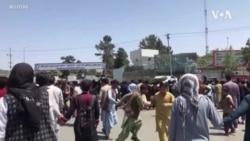ປະທານາທິບໍດີສະຫະລັດ ທ່ານໂຈ ໄບເດັນ ເຂົ້າຮັບຕໍາແໜ່ງພ້ອມດ້ວຍຂໍ້ຄວາມວ່າ “ອາເມຣິກາ ກັບຄືນມາແລ້ວ,” ແລະ ທ່ານກໍໄດ້ໃຫ້ສັນຍາວ່າ ວຽກງານທາງດ້ານການທູດຈະເຂົ້າມາແທນທີ່ການໃຊ້ອໍານາດທາງທະຫານເພື່ອເປັນເຄື່ອງມືຫຼັກ ໃນນະໂຍບາຍການຕ່າງປະເທດຂອງສະຫະລັດ. ຫົວໜ້ານັກຂ່າວວີໂອເອປະຈໍາທໍານຽບຂາວ ແພັດຊີ ວິດາກຸສວາຣາ (Patsy Widakuswara) ມີບົດສະຫຼຸບທ້າຍປີ ກ່ຽວກັບນະໂຍບາຍການຕ່າງປະເທດຂອງປີທໍາອິດໃນການ ດໍາລົງຕໍາແໜ່ງຂອງປະທານາທິບໍດີສະຫະລັດ. ເຊິ່ງ ທິບສຸດາ ຈະນໍາເອົາລາຍລະ ອຽດ ມາສະເໜີທ່ານໃນອັນດັບຕໍ່ໄປ.
ເປັນເວລາເກືອບນຶ່ງປີສໍາລັບນະໂຍບາຍການຕ່າງປະເທດຂອງສະຫະລັດ ໂດຍການຖອນໂຕອອກຈາກອັຟການິສຖານທີ່ສັບສົນວຸ້ນວາຍໃນຊ່ວງເດືອນສິງຫາທີ່ຜ່ານມາ, ເຊິ່ງຖືກມອງວ່າ ເປັນຄວາມຜິດພາດທີ່ໃຫຍ່ຫຼວງທີ່ສຸດໃນການດໍາລົງ ຕໍາແໜ່ງປີທໍາອິດ ຂອງປະທານາທິບໍດີໂຈ ໄບເດັນ.
ທ່ານໄມໂຄລ ຄູເກລແມນ (Michael Kugelman), ເຈົ້າໜ້າທີ່ອະວຸໂສສຳລັບເຂດເອເຊຍໃຕ້ ຈາກສູນກາງວີລຊັນ ກ່າວຜ່ານທາງສະໄກປ໌ວ່າ:
“ການກໍ່ການຮ້າຍ ໄດ້ເພີ້ມທະວີຄວາມຮຸນແຮງຂຶ້ນ, ແລະການເຂົ້າຢຶດຄອງປະ ເທດຂອງກຸ່ມຕາລິບານ ໄດ້ນໍາໄປສູ່ການຂວໍ້າບາດທີ່ເຮັດໃຫ້ປະເທດອັຟການິສຖານຕົກຢູ່ໃນສະພາບທີ່ເກີດວິກິດການຢ່າງຮຸນແຮງທາງດ້ານມະນຸດສະທໍາ ອັນຈະນໍາໄປສູ່ຄວາມອຶດຫິວຄັ້ງໃຫຍ່ໄດ້. ແລະຂ້າພະເຈົ້າກໍຄິດວ່າ ການຖອນໂຕທີ່ສັບສົນວຸ້ນວາຍ ແລະຮີບດ່ວນທີ່ສຸດ ຂອງສະຫະລັດນີ້ ສະແດງໃຫ້ເຫັນວ່າມັນເຊື່ອມໂຍງກັນຕໍ່ຜົນທີ່ໄດ້ຮັບນັ້ນ.”
ການຖອນໂຕດັ່ງກ່າວ ແມ່ນສອດຄ່ອງກັບເປົ້າໝາຍຂອງລັດຖະບານທີ່ຈະຫຼຸດການພົວພັນທາງທະຫານຢູ່ໃນພາກຕາເວັນອອກກາງ.
ແຕ່ຄວາມທ້າທ້າຍຕ່າງໆແມ່ນຍັງຄົງມີຢູ່, ລວມເຖິງຄວາມເຄັ່ງຕຶງທີ່ຍັງມີຢູ່ລະ ຫວ່າງ ອິສຣາແອລ ກັບປາແລັສໄຕນ໌, ແລະຄວາມພະຍາຍາມທີ່ຕົກຢູ່ໃນສະ
ພາບບໍ່ໄປບໍ່ມາ ເພື່ອຊ່ວຍກອບກູ້ ແຜນການປະຕິບັດງານຮ່ວມຮອບດ້ານ ຫຼື JCPOA, ຂໍ້ຕົກລົງນິວເຄລຍ ອີຣ່ານ ປີ 2015 ກັບປະເທດມະຫາອໍານາດໂລກ ທີ່ລັດຖະບານຂອງທ່ານ ທຣໍາ ໄດ້ຖອນໂຕອອກ ໃນປີ 2018.
ນອກຈາກນັ້ນ, ຫຼັງຈາກຫຼາຍປີຂອງແບບແຜນ ‘ອາເມຣິກາມາກ່ອນໝູ່’ ພາຍໃຕ້ລັດຖະບານ ຂອງອະດີດປະທານາທິບໍດີດໍໂນລ ທຣໍາ, ແຕ່ຂໍ້ຄວາມຂອງທ່ານ ໄບເດັນ ກ່າວວ່າ ‘ອາເມຣິກາກັບມາແລ້ວ.’
ເຊິ່ງ ປະທານາທິບໍດີ ໂຈ ໄບເດັນ ກ່າວວ່າ:
“ພວກເຮົາຈະຢືນຢັດເພື່ອບັນດາພັນທະມິດຂອງພວກເຮົາ ພ້ອມກັບໝູ່ເພື່ອນທັງ ຫຼາຍຂອງພວກເຮົາ, ແລະພະຍາຍາມຂັດຂວາງການຄອບຄອງບັນດາປະເທດທີ່ອ່ອນແອກວ່າ ໂດຍປະເທດທີ່ເຂັ້ມແຂງກວ່າທັງຫຼາຍ, ບໍ່ວ່າຈະເປັນການປ່ຽນແປງອານາເຂດດ້ວຍກອງກໍາລັງທາງທະຫານ, ການບີບບັງຄັບທາງດ້ານເສດຖະກິດ, ການເອົາປຽບທາງດ້ານເທັກໂນໂລຈີ ຫຼືການບິດເບືອນຂໍ້ມູນຕ່າງໆ. ແຕ່ພວກເຮົາບໍ່ໄດ້ສະແຫວງຫາ, ຂໍເວົ້າອີກຄັ້ງວ່າ ພວກເຮົາບໍ່ໄດ້ສະແຫວງຫາສົງຄາມເຢັນຄັ້ງໃໝ່ ຫຼືໂລກທີ່ຖືກແບ່ງອອກເປັນກຸ່ມທີ່ແຂງກະດ້າງ.”
ແຕ່ທ່ານໄບເດັນ ໄດ້ຂີດເສັ້ນແບ່ງໄວ້ ເຊິ່ງເປັນສິ່ງທີ່ທ່ານຮ້ອງວ່າ ການຕໍ່ສູ້ລະຫວ່າງລະບອບປະຊາທິປະໄຕ ແລະລະບອບຜະເດັດການ. ທ່ານໄບເດັນ ໄດ້ຮວບຮວມໄດ້ຫຼາຍກວ່າ 100 ປະເທດໃນການປະຊຸມສຸດຍອດທາງອອນໄລນ໌ ເພື່ອປະຊາທິປະໄຕໃນເດືອນທັນວານີ້, ຍົກເວັ້ນ ປະທານປະເທດຈີນ
ທ່ານສີ ຈິ້ນຜິງ ແລະປະທານາທິບໍດີ ຣັດເຊຍ ທ່ານວລາດີເມຍ ປູຕິນ, ໂດຍພົບປະທາງອອນໄລນ໌ ເນື່ອງໃນໂອກາດຕ່າງໆທີ່ແຕກຕ່າງກັນ, ເປັນການເນັ້ນຢໍ້າເຖິງຄວາມສໍາຄັນໃນຫຼັກການນະໂຍບາຍຕ່າງປະເທດຂອງທ່ານ.
ທ່ານນາງສະເຕຊີ ກອດດາຣ໌ດ (Stacie Goddard), ສາດສະດາຈານທາງດ້ານລັດຖະສາດ ຂອງ ໄມດ໌ເຮດ ເລນ ເຄັມເປີ ແຫ່ງມະຫາວິທະຍາໄລ ເວລເລສລີ ກ່າວຜ່ານທາງສະໄກປ໌ວ່າ:
“ການຮ່ວມມືລະດັບໂລກໃນປະເດັນທີ່ຊັບຊ້ອນກ່ຽວກັບສິ່ງແວດລ້ອມ ແລະໂຣກລະບາດທີ່ຈໍາເປັນຕ້ອງມີການຮ່ວມມືກັບຈີນ, ທີ່ຈໍາເປັນຕ້ອງໄດ້ມີການຮ່ວມມືກັບຣັດເຊຍ. ແຕ່ໃນທາງອື່ນແລ້ວ, ໃນຄວາມພະຍາຍາມທີ່ຈະຮັກສາແກ່ນແທ້ຂອງສະຫະລັດນັ້ນ ແມ່ນຈະຕ້ອງຮ່ວມມືກັບລະບອບປະຊາທິປະໄຕເຊັ່ນກັນ, ສະຫະລັດ ເປັນປະເທດແຫ່ງປະຊາທິປະໄຕ. ແລະສະຫະລັດມອງເຫັນວ່າ ຄວາມທ້າທາຍຂອງລະບອບຜະເດັດການ ຄືຄວາມທ້າທາຍທີ່ສໍາຄັນ.”
ຈີນ, ປັດຈຸບັນອາດເປັນຄູ່ແຂ່ງທີ່ສໍາຄັນທາງທະຫານ ແລະອິດທິພົນທາງພູມິ ສາດການເມືອງຄືນະໂຍບາຍການຕ່າງປະເທດທີ່ສໍາຄັນສຸດຂອງທ່ານ ໄບເດັນ.
ແຕ່ຣັດເຊຍ ເຊິ່ງເປັນອີກຄູ່ແຂ່ງນຶ່ງ ແມ່ນບໍ່ຍອມຢືນຢູ່ທາງນອກ, ໂດຍມີການລະດົມກອງກໍາລັງທະຫານຫຼາຍພັນຄົນໄປປະຈໍາຢູ່ຕາມແນວຊາຍແດນຂອງຢູເຄຣນ.
ທ່ານແອນດຣູ ໂລເຊນ (Andrew Lohsen), ສະມາຊິກໃນໂຄງການຢູໂຣບ, ຣັດເຊຍ ແລະຢູຣາເຊຍ ແຫ່ງສູນກາງເພື່ອຍຸດທະສາດ ແລະການສຶກສາລະຫວ່າງຊາດ ກ່າວຜ່ານທາງສະໄກປ໌ວ່າ:
“ຣັດເຊຍບໍ່ແມ່ນບັນຫາທີ່ໄດ້ຮັບການແກ້ໄຂ. ຍັງຄົງເປັນໂຕເອກທີ່ມີຄວາມສົນ ໃຈອັນແຕກຕ່າງຈາກສະຫະລັດ ແລະບັນດາປະເທດພັນທະມິດຢູໂຣບຂອງພວກເຮົາ. ແລະດັ່ງນັ້ນ, ມັນຈຶ່ງບໍ່ສາມາດທີ່ຈະເກັບມ້ຽນໄວ້ໃນຫີບໄດ້. ຂ້າພະ ເຈົ້າຄິດວ່າ ສິ່ງທີ່ພວກເຮົາເຫັນນະທີ່ນີ້ຄື ພຶດຕິກໍາບາງຢ່າງຈາກສະຫະພັນຣັດເຊຍ ເພື່ອເຕືອນສະຫະລັດວ່າ ພວກເຂົາເຈົ້າສົນໃຈ ແຕ່ໃນສິ່ງທີ່ພວກເຂົາເຈົ້າຢາກຕິດຕາມ ແລະບໍ່ສາມາດປ່ອຍປະຄວາມສົນໃຈຕ່າງໆເຫຼົ່ານັ້ນໄດ້.”
ບັນຫາທີ່ຍັງບໍ່ທັນໄດ້ຮັບການແກ້ໄຂອີກອັນນຶ່ງກໍຄື ເກົາຫຼີເໜືອ, ເຊິ່ງລັດຖະບານຂອງປະເທດດັ່ງກ່າວ ບໍ່ເຕັມໃຈທີ່ຕັດຂໍ້ຕົກລົງ, ເວັ້ນເສຍແຕ່ວ່າ ທ່ານກິມ ຈົງ ອຶນ ຈະຍຸຕິໂຄງການອາວຸດນິວເຄລຍຂອງພວກເຂົາເຈົ້າ.
U.S. President Joe Biden came into office with the message “America is back,” and he promised that diplomacy would replace military power as the main instrument of U.S. foreign policy. White House Bureau Chief Patsy Widakuswara has this recap of the U.S. president’s policies abroad in his first year in office.
It’s been a quite a year in U.S. foreign policy — with the chaotic withdrawal from Afghanistan in August, widely seen as the biggest failure of President Joe Biden’s first year in office.
Michael Kugelman, senior associate for South Asia at the Wilson Center (via Skype)
“Terrorism has intensified, and the Taliban takeover has led to sanctions that have put Afghanistan in a position where it has an acute humanitarian crisis that could well lead to mass famine. And I think that this very precipitate, chaotic U.S. withdrawal is seen as links to those outcomes.”
The withdrawal is in line with the administration’s goal to decrease military engagement in the Middle East.
But challenges remain, including existing tensions between Israelis and Palestinians, and the stalled effort to rescue the Joint Comprehensive Plan of Action, or JCPOA, the 2015 Iran nuclear deal with world powers that the Trump administration withdrew from in 2018.
Still, following years of America First under former President Donald Trump, Biden’s message is that America is back.
President Joe Biden
“We'll stand up for our allies and our friends and oppose attempts by stronger countries that dominate weaker ones, whether through changes to territory by force, economic coercion, technical exploitation or disinformation. But we're not seeking, say it again, we are not seeking a new Cold War, or a world divided into rigid blocs."
But Biden has drawn fault lines — what he calls the struggle between democracies and autocracies. He rallied more than 100 countries at a virtual Summit for Democracy in December, excluding Chinese President Xi Jinping and Russian President Vladimir Putin, whom he met virtually on separate occasions, reinforcing a key theme in his foreign policy doctrine.
Stacie Goddard, the Mildred Lane Kemper Professor of Political Science at Wellesley College (Skype)
“Global cooperation around complex issues with the environment and pandemics that require cooperation with China, that require cooperation with Russia. But on the other hand, also trying to keep on this theme of the United States will cooperate with democracies, the United States is a democratic nation. And the United States does see an authoritarian challenge as a significant challenge.”
China, now a major adversary in military might and geopolitical influence, is Biden’s foreign policy priority.
But Russia, another rival, is not staying on the sidelines, mobilizing tens of thousands of troops along the Ukrainian border.
Andrew Lohsen, a fellow in the Europe, Russia and Eurasia Program at the Center for Strategic and International Studies (Skype)
“Russia is not a solved problem. It’s still a major actor that has interests that are divergent with the United States and our European allies. And so it really can’t be put in the box. I think what we’re seeing here is some behavior from the Russian Federation to remind the United States that it’s so they’re interested in wanting to pursue and that those interests can’t be ignored.”
Another unsolved problem is North Korea, where the administration is unwilling to cut a deal unless Kim Jong Un commits to winding down his nuclear weapons program.





